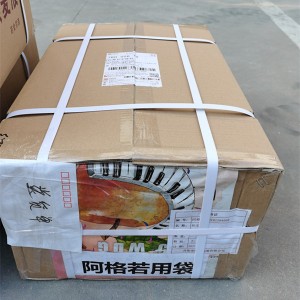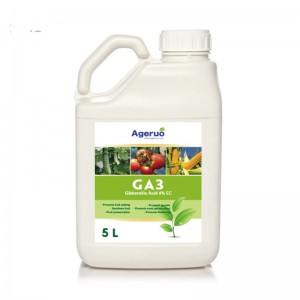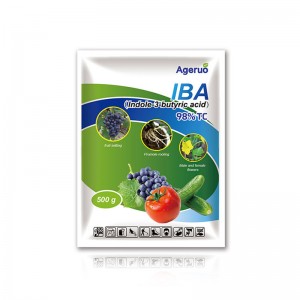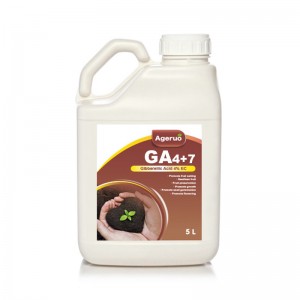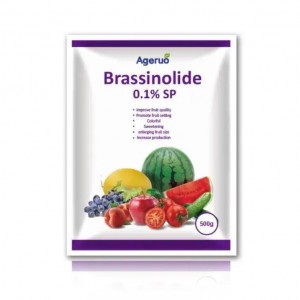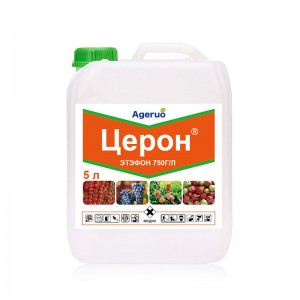Products
POMAIS Plant Growth Regulator Prohexadione Calcium 10%WDG
Prohexadione Calcium
Prohexadione Calcium is a plant growth regulator widely used in agricultural production. It controls plant growth by inhibiting the biosynthesis of gibberellins, resulting in shorter and stronger plants, improved disease resistance, and reduced risk of collapse.
| Active ingredients | Prohexadione Calcium |
| CAS Number | 127277-53-6 |
| Molecular Formula | 2(C10h11o5)Ca |
| Application | Hestening Rooting, Promote Plant Growth, Restrain The Growth of The Stem Leaf Bud, Inhibition of Flower Bud Formation, Improve The Amino Acid Content, Raise The Protein Content, Increase The Sugar Content, Promote The Fruit Coloring, Increase Lipid Content |
| Brand Name | POMAIS |
| Shelf life | 2 Years |
| Purity | 5% WDG |
| State | Granular |
| Label | Customized |
| Formulations | 5% WDG; 15%WDG |
| The mixed formulation product | Prohexadione calcium 15% WDG+ Mepiquat Chloride 10% SP |
Functional characteristics of Prohexadione Calcium
Control plant growth
Prohexadione Calcium can effectively control plant growth, reduce plant height and internode length, make plants shorter and sturdier, thus reducing the risk of collapse.
Improves disease resistance
Prohexadione Calcium improves plant disease resistance, reduces the incidence of certain diseases and improves crop health.
Promotes yield and quality
Through the proper use of Prohexadione Calcium, crop yield and quality can be improved, resulting in larger, sweeter fruits, greener leaves and greater photosynthesis.
Safety of Prohexadione Calcium
Prohexadione Calcium is environmentally friendly, with no residual toxicity and no pollution, making it suitable for a wide range of crop management applications.
Mode of Action
The main mechanism of action of Prohexadione Calcium is to control plant growth by inhibiting gibberellin biosynthesis and reducing plant height and internode length. This plant regulator also improves plant disease resistance and reduces the incidence of certain diseases.
By inhibiting the biosynthesis of GA1, prohexadione calcium can protect the endogenous GA4 of plants, achieve the transformation from controlling vegetative growth to reproductive growth, play a role in protecting flowers and fruits, and finally lead to an increase in the number of fruits. By removing plant feedback inhibition, it can increase photosynthesis, so that crops can obtain more photosynthates, and provide energy for reproductive growth.
Applications of Prohexadione Calcium
Fruit Tree Management
Apples
Prohexadione Calcium can slow down apple spring growth, reduce the number of long and unproductive branches, and improve fruit quality and yield through whole-plant spraying or canopy spraying. It also has a preventive effect on diseases caused by bacteria and fungi such as fire blight.
Pear
The use of Prohexadione Calcium can significantly inhibit the vigorous growth of new shoots in pear, promote fruit set, enhance fruit light, and improve fruit quality and yield.
Peach
Spraying Prohexadione Calcium on peaches in the fall after picking can effectively slow down the growth of fall shoots, reduce the number of long shoots, and promote the accumulation of nutrients to leaves, winter buds and branches.
Grape
Spraying Prohexadione Calcium solution before flowering can inhibit the vigorous growth of new shoots, shorten the distance between nodes, and increase the number of leaves and branch thickness.
Cherry
Whole-plant spraying of Prohexadione Calcium can significantly inhibit the vigorous growth of new shoots, promote fruit set, enhance fruit light, and improve fruit quality and yield.
Strawberry
Spraying Prohexadione Calcium solution before and after seedling establishment can control the vigorous growth of seedlings, promote branching and rooting, increase the number of flowers, and improve the fruit set rate.
Mango
Spraying Prohexadione Calcium solution after the second green tip can control mango flush, reduce tip length and promote early flowering.
Cereal Crop Management
Rice
Prohexadione Calcium can shorten the basal node spacing of rice, effectively controlling the vigorous growth, reducing the fall and promoting the increase of yield. It can also increase yield by improving thousand grain weight, fruiting rate and spike length.
Wheat
Prohexadione Calcium can dwarf wheat plant height, reduce internode length, increase stem thickness, improve photosynthetic rate, increase thousand grain weight and yield.
Peanut
Prohexadione Calcium effectively reduces peanut plant height, shortens internode length, increases the number of hypodermic needles, and increases leaf photosynthetic intensity, root vigor, fruit weight and yield.
Cucumber, Tomato
Diluted foliar spraying of Prohexadione Calcium can inhibit the nutritive growth of leaves and stems of cucumber and tomato, and improve yield and quality.
Sweet potato
Spraying Prohexadione Calcium solution at the early flowering stage can significantly inhibit the vigorous growth of sweet potato vines, promote the transfer of nutrients to the underground part, and increase the yield.
Suitable crops:

Using Method
Prohexadione Calcium can be applied by whole-plant spraying, canopy spraying or foliar spraying, depending on the type of crop and stage of growth.
|
Formulations |
Crop names |
Function |
Dosage |
Using method |
|
5% WDG |
Rice |
Regulate growth |
300-450 g/ha |
Spray |
|
peanut |
Regulate growth |
750-1125 g/ha |
Spray |
|
|
Wheat |
Regulate growth |
750-1125 g/ha |
Spray |
|
|
Potato |
Regulate growth |
300-600 g/ha |
Spray |
|
| 15% WDG |
Rice |
Regulate growth |
120-150 g/ha |
Spray |
|
Tall fescue lawn |
Regulate growth |
1200-1995 g/ha |
Spray |
The application rate should be adjusted according to the specific crop, the environmental conditions and the expected effect, to avoid overdose which may lead to chemical damage.
Precautions for Prohexadione Calcium
Prohexadione Calcium has a short half-life and rapid degradation, so it is not harmful to the crop after proper use.
Prohexadione Calcium is easy to decompose in acidic medium, and it is strictly prohibited to mix it with acidic fertilizers directly.
The effect will be different in different kinds of crops and at different time of use, please do small area test before promotion.
FAQ
Frequently Asked Questions
1. What is the main function of Prohexadione Calcium?
Prohexadione Calcium controls plant growth by inhibiting gibberellin biosynthesis, resulting in shorter and stronger plants, improved disease resistance and reduced risk of fall.
2. Which crops is Prohexadione Calcium suitable for?
Prohexadione Calcium is widely used in the management of fruit trees (e.g. apples, pears, peaches, grapes, large cherries, strawberries, mangoes) and cereal crops (e.g. rice, wheat, peanuts, cucumbers, tomatoes, sweet potatoes).
3. What should I be aware of when using Prohexadione Calcium?
When using Prohexadione Calcium, it should be noted that it has a short half-life, fast degradation, not mixed with acidic fertilizers, and its effect varies in different varieties and periods of use, so it needs to be tested on a small area before promotion.
4. Does Prohexadione Calcium have any effect on the environment?
Prohexadione Calcium is environmentally friendly, no residual toxicity, no pollution of the environment, suitable for a wide range of crop management.
5. How to apply Prohexadione Calcium?
Prohexadione Calcium can be applied by whole-plant spraying, canopy spraying or foliar spraying, depending on the type of crop and growth stage.
6. How to get a quote?
Please click "Message" to tell us the products, contents, packaging requirements and quantity you are interested in, and our staff will make an offer to you as soon as possible.
7. How does your factory carry out quality control?
Quality priority. Our factory has passed the authentication of ISO9001:2000. We have First-class quality products and strict pre-shipment inspection. You can send samples for testing, and we welcome you to check the inspection before shipment.
Why Choose US
Strict quality control procedure in each period of order and the third-party quality inspection.
Within 3 days to confirm the package details,15 days to produce package materials and purchase products raw material,5 days to finish packaging, one day showing pictures to clients, 3-5days delivery from factory to shipping ports.
We have advantage on technology especially on formulating. Our technology authorities and experts act as consultants whenever our customers have any problem on agrochemical and crop protection.



